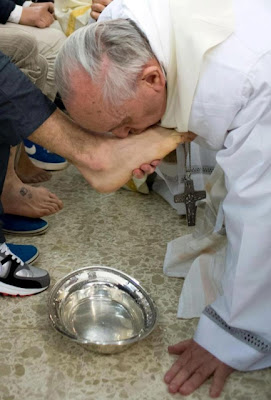Carmelite
Ruth Burrows writes: “God is the ultimate self-squander, always giving Himself
as far as He can be received, and always trying to enlarge our capacity so He
can give Himself even more fully.” Christmas celebrates how this self-giving is
revealed in an astonishingly tangible way. And as our Franciscan tradition
emphasises it does not stop there. The “sublime humility” that Francis wrote of
continues in the Passion and daily in the Eucharist – the Crib, the Cross and
the Cup.
Francis’ encounter with the God who squanders Himself in love led Francis
to an understanding of sine proprio - living without anything of one's own - that is far deeper than material
poverty. Responding in grace to this God “who gives Himself totally” Francis
asks us to “hold back nothing of ourselves for ourselves”.
He teaches, especially in the Admonitions, how our hanging on to, our
refusal to surrender our comforts, our status and position, our entrenched
attitudes, our ways of doing things, our hurts and resentments – how this
greatly hinders the work of the Spirit of the Lord in us and through us. The
aim is to be fully available to God and fully free to serve the Gospel.
This deeper understanding of sine proprio
came to mind when I read Pope
Francis’ Evangelii Gaudium. He issues
a radical call to Gospel freedom, a willingness to surrender what no longer
serves the mission entrusted to us. “I dream of a ‘missionary option’, that is,
a missionary impulse capable of transforming everything, so that the Church’s
customs, ways of doing things, times and schedules, language and structures can
be suitably channeled for the evangelization of today’s world rather than for
her self-preservation.”
The Pope
says rather than being afraid of "going astray," what the Church ought
to fear instead is "remaining shut up within structures that give us a
false sense of security" and "within habits that make us feel
safe."
Of course, what Francis writes of the Church can
also be applied to my life and to Order and fraternity I belong to. There is
always the danger of routine instilling staleness into life and ministry, a
sapping spirit that robs them of joy and energy so that “mission” is
reduced to certain routine practices.
In contrast to
such an attitude Pope Francis sees mission as rooted in his very identity: “My
mission of being in the heart of the people is not just a part of my life or a
badge I can take off; it is not an “extra” or just another moment in life.
Instead, it is something I cannot uproot from my being without destroying my
very self. I am a mission on this earth; that is the reason
why I am here in this world.”
Only the deep inward working of the Spirit can stirs us to generous
self-giving by granting us a share in the Divine Self-Squander's love for the world.



















